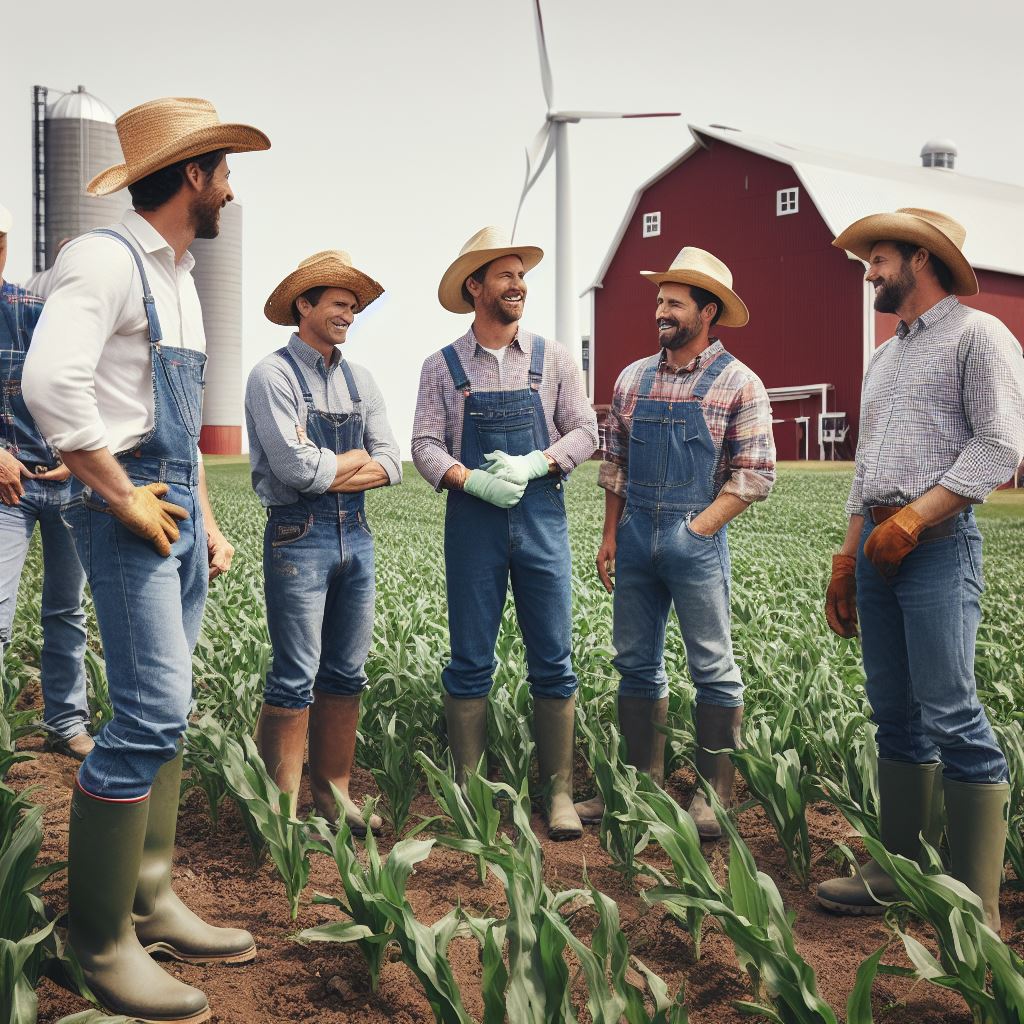Introduction
Food safety laws play a crucial role in ensuring the well-being of farmers.
In an era where global markets intertwine and consumer awareness heightens, the relationship between farmers and food safety laws becomes pivotal.
These regulations serve as the guardians of public well-being, setting benchmarks for agricultural practices that resonate far beyond the fields.
This blog section provides an overview of the impact of food safety laws on farmers.
As we embark on this journey, it becomes imperative to scrutinize the multifaceted facets: How do food safety laws shape cultivation methodologies?
What challenges do farmers encounter in compliance? And, in turn, how does this adherence contribute to a safer, more resilient food ecosystem?
The symbiosis between farmers and food safety laws is not merely a legal obligation but a nuanced dance of adaptation and innovation.
Through this lens, we unravel not only the challenges but also the opportunities that arise from a collective commitment to ensuring the safety and integrity of our food supply.
As we traverse the landscape of Food Safety Laws and their impact on farmers, we gain insights into the evolving narrative that links the agrarian heartbeat to the broader pulse of public health and global food security.
Overview of food safety laws
Definition and purpose
Food safety laws are regulations implemented to ensure the safety and wholesomeness of food products.
Examples of key food safety laws
- Food Safety Modernization Act (FSMA): This law was passed in 2011 to enhance food safety standards and prevent foodborne illnesses.
- Good Agricultural Practices (GAP): GAP guidelines aim to minimize the risk of contamination during farming operations.
- Hazard Analysis and Critical Control Points (HACCP): This system is used to identify and control hazards in food production processes.
Compliance requirements for farmers
Farmers must adhere to specific regulations to ensure compliance with food safety laws.
These requirements include:
- Implementing proper hygiene practices: Farmers must maintain cleanliness in their operations and adopt appropriate sanitation measures.
- Monitoring and record-keeping: Regular monitoring of production processes and meticulous record-keeping is essential to demonstrate compliance.
- Training and education: Farmers should undergo training to understand food safety principles and stay updated with the latest regulations.
- Adopting preventive controls: Implementing measures to prevent contamination, such as using approved pesticides and implementing pest control measures.
- Testing and inspections: Regular testing of soil, water, and produce samples, as well as inspections by regulatory authorities, are necessary to ensure compliance.
Food safety laws have a significant impact on farmers, as they can affect the way they operate their farms and the costs associated with compliance.
While these laws are designed to protect public health, they can pose challenges for farmers who have to navigate complex requirements and invest additional resources to meet them.
Examples of key food safety laws
Food Safety Modernization Act (FSMA
One of the key food safety laws, the Food Safety Modernization Act (FSMA), has had a substantial impact on farmers in recent years.
Transform Your Agribusiness
Unlock your farm's potential with expert advice tailored to your needs. Get actionable steps that drive real results.
Get StartedThe FSMA shifted the focus from responding to foodborne illnesses to preventing them.
This means that farmers now have more responsibility for ensuring the safety of their products throughout the supply chain.
Under the FSMA, farmers are required to implement preventive controls, such as regular testing and monitoring, to identify and minimize potential hazards.
They must also maintain detailed records to track their compliance efforts and be prepared for inspections by regulatory authorities.
These additional requirements can create a burden for farmers, especially small-scale producers with limited resources.
Good Agricultural Practices (GAP)
Another important food safety law that affects farmers is Good Agricultural Practices (GAP).
GAP provides guidelines for safe and sustainable farming practices to minimize the risk of contamination.
Farmers must comply with GAP protocols, which include maintaining proper hygiene, using safe irrigation water, and managing waste appropriately.
Hazard Analysis and Critical Control Points (HACCP)
Hazard Analysis and Critical Control Points (HACCP) is a system that helps farmers identify and control potential hazards in their production processes.
It requires farmers to establish and implement procedures to prevent or reduce hazards, such as monitoring temperature during processing or storage.
In general, food safety laws play a crucial role in ensuring the safety and integrity of our food supply.
While they are necessary for protecting public health, these laws can impose additional burdens on farmers.
It is essential for farmers to understand and comply with the specific regulations related to food safety to maintain consumer trust and market access.
Read: Farming Subsidies in Japan: 2024 Update
Impact of food safety laws on farmers
Food safety laws have a significant impact on farmers, affecting various aspects of their operations.
This section explores the implications of these laws on farmers, including financial, operational, and administrative changes.
Financial implications
Implementing food safety practices can involve substantial costs for farmers.
They may need to invest in infrastructure and equipment to meet the required standards.
For example, constructing processing facilities, cold storage units, or upgrading irrigation systems may be necessary to ensure food safety.
These costs can pose financial challenges for farmers, especially for small-scale operations.
Additionally, compliance with food safety laws often involves audits and certifications.
Farmers may be required to pay fees for third-party audits or seek certification from recognized organizations.
These expenses can further increase the financial burden on farmers.
Changes in farming practices
Food safety laws often necessitate changes in farming practices to minimize the risk of contamination.
Showcase Your Farming Business
Publish your professional farming services profile on our blog for a one-time fee of $200 and reach a dedicated audience of farmers and agribusiness owners.
Publish Your ProfileFarmers may need to adopt new technologies and equipment, such as precision agricultural tools or advanced monitoring systems, to ensure the safety of their products.
These technological advancements can enhance traceability and allow farmers to identify and address potential food safety hazards more effectively.
Furthermore, modifications in production methods may be required to align with food safety regulations.
Farmers may need to implement stricter sanitation protocols, revise harvesting and storage practices, or establish separate zones for different crops to prevent cross-contamination.
These changes can enhance food safety but may require adjustments in traditional farming practices.
Administrative burdens
Food safety laws often impose administrative responsibilities on farmers.
Maintaining thorough record-keeping and documentation is a crucial requirement.
Farmers must keep track of various aspects of their operations, including inputs, processes, and outputs, to ensure traceability and accountability.
The time and effort spent on record-keeping can be significant, especially for small farmers who have limited resources and personnel.
In addition to record-keeping, farmers may need to undergo training and education to understand and implement food safety practices effectively.
Staying updated with evolving regulations and requirements can be a continuous process, demanding continuous learning and adaptation.
This further adds to the administrative burden on farmers, who already face multiple responsibilities in managing their operations.
In summary, food safety laws have profound implications for farmers.
They can result in financial challenges, requiring investments in infrastructure and compliance-related expenses.
The adoption of new technologies and modifications in production methods may be necessary to meet food safety requirements.
Additionally, administrative burdens, including record-keeping and training demands, add to the challenges faced by farmers in complying with food safety laws.
Read: Agri-Taxation: Recent Global Reforms

Benefits of food safety laws for farmers
Enhanced reputation and market access
Food safety laws help farmers improve their reputation in the market by ensuring the production of safe and healthy food products.
By complying with these laws, farmers can gain access to new markets and expand their customer base.
Reduction in foodborne illness outbreaks
Food safety laws set strict guidelines for farm practices, reducing the risk of contamination and the occurrence of foodborne illnesses.
By implementing these laws, farmers can protect consumers from the harmful effects of contaminated food and, in turn, secure public health.
Increased consumer trust and confidence
Food safety laws provide consumers with the assurance that the food they purchase is safe for consumption.
By adhering to these laws, farmers can build trust with their customers, leading to increased loyalty and repeat business.
Potential for higher profitability in the long run
Although ensuring compliance with food safety laws may involve initial costs, it can lead to higher profitability in the long run.
By producing safe and high-quality food, farmers can command premium prices and establish a competitive edge in the market.
Read: NAFTA 2.0: Implications for North American Ag
Challenges faced by farmers in complying with food safety laws
Lack of resources and support
- Small-scale farmers often lack the financial resources needed to implement food safety practices.
- Limited access to training and technical assistance on food safety measures.
- Insufficient infrastructure, such as storage facilities and processing equipment, hinders compliance.
- Inadequate funding and government support for farmers to meet necessary requirements.
Disproportionate burdens on small-scale and organic farmers
- Food safety regulations designed for large-scale farming operations may not be feasible for small-scale farmers.
- Organic farmers face additional challenges in complying with both food safety and organic certification requirements.
- Increased costs for small-scale and organic farmers to implement specialized food safety practices.
- Limited market access due to the inability to afford the necessary compliance measures.
Need for customized solutions based on farm size and type
- Food safety laws should consider the diversity of farming operations and tailor requirements accordingly.
- Different farm types, such as livestock farms or vegetable farms, have unique challenges that need specific solutions.
- Customized guidelines and resources for farmers of various scales can ensure effective compliance.
- Collaboration between farmers, regulatory agencies, and industry stakeholders to develop practical solutions.
Overall, farmers face various challenges in complying with food safety laws.
Lack of resources and support, disproportionate burdens on small-scale and organic farmers, and the need for customized solutions based on farm size and type are some of the main issues.
A collaborative effort is necessary to address these challenges and ensure food safety without disproportionately impacting farmers.
Read: India New Farm Bills: An In-Depth Look
Strategies for farmers to navigate food safety laws
Engaging in industry associations and collaborations
- Join industry associations to stay updated on food safety regulations.
- Collaborate with other farmers to share knowledge and resources for compliance.
- Participate in industry conferences and workshops to learn best practices.
Utilizing available training and technical assistance programs
- Take advantage of training programs offered by government agencies.
- Seek technical assistance from experts to understand food safety requirements.
- Stay informed about grants and funds available for farmer education and compliance.
Building relationships with food safety experts and consultants
- Consult with food safety experts to develop and implement effective practices.
- Hire consultants to conduct audits and ensure compliance with regulations.
- Establish ongoing partnerships with experts for continuous support and advice.
Conclusion
Food safety laws have significantly impacted farmers, requiring them to implement new protocols and invest in infrastructure and training to ensure compliance and maintain consumer trust.
As food safety regulations continue to evolve, farmers must receive ongoing support from government entities, agricultural organizations, and consumers to adapt and meet new requirements.
It is crucial for farmers to prioritize food safety by implementing robust procedures and maintaining compliance with regulations to protect public health and maintain a positive reputation within the industry.
The impact of food safety laws on farmers cannot be overstated.
These laws have brought significant changes to the agricultural sector, requiring farmers to adapt and invest in order to ensure the safety of their products.
Ongoing support and collaboration from various stakeholders are necessary for farmers to navigate these regulations effectively.
By prioritizing food safety and compliance efforts, farmers can not only safeguard public health but also secure consumer trust and confidence in their products, contributing to a sustainable and thriving agricultural industry.




